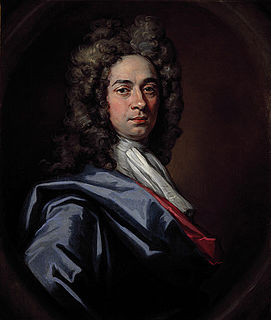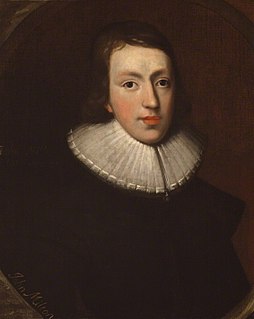
Richard Bentley was an English classical scholar, critic, and theologian. He was Master of Trinity College, Cambridge.
Theon of Alexandria was a Greek scholar and mathematician who lived in Alexandria, Egypt. He edited and arranged Euclid's Elements and wrote commentaries on works by Euclid and Ptolemy. His daughter Hypatia also won fame as a mathematician.
Thomas Keightley was an Irish writer known for his works on mythology and folklore, particularly Fairy Mythology (1828), reprinted as The World Guide to Gnomes, Fairies, Elves, and Other Little People. Regarded as a pioneer in the study of Folklore by modern scholars in the field, he was one of the "early and important comparativist collectors" of folklore. A circumspect scholar, he did not deem that similar tales recognizable across countries automatically signified transmission, but allowed that similar tales could arise independently in different cultures.
The Praier and Complaynte of the Ploweman unto Christe: written not longe after the yere of our Lorde. M. and three hundred is a short, anonymous English Christian text, probably written in the late fourteenth or early fifteenth century and first printed in about 1531. It consists of a prose tract, in the form of a polemical prayer, expressing Lollard sentiments and arguing for religious reform. In it, the simple ploughman/narrator speaks on behalf of "the repressed common man imbued with the simple truths of the Bible and a knowledge of the commandments against the mighty and monolithic conservative church". The pastoral-ecclesiastical metaphor of shepherds and sheep is used extensively as a number of criticisms are made about such things as confession, indulgences, purgatory, tithing and celibacy. The Prayer became important in the sixteenth century, when its themes were taken up by proponents of the Protestant Reformation.
Milton's Prosody, with a chapter on Accentual Verse and Notes is a book by Robert Bridges. It was first published by Oxford University Press in 1889, and a final revised edition was published in 1921.

Cain is a dramatic work by Lord Byron published in 1821. In Cain, Byron dramatizes the story of Cain and Abel from Cain's point of view. Cain is an example of the literary genre known as closet drama.
Patrick Hume may refer to:
The Arden Shakespeare is a long-running series of scholarly editions of the works of William Shakespeare. It presents fully edited modern-spelling editions of the plays and poems, with lengthy introductions and full commentaries. There have been three distinct series of the Arden Shakespeare over the past century, and the third series has not yet been completed. Arden was the maiden name of Shakespeare's mother, Mary, but the primary reference of the enterprise's title is named after the Forest of Arden, in which Shakespeare's As You Like It is set.
Nationality words link to articles with information on the nation's poetry or literature.
The Ready and Easy Way to Establish a Free Commonwealth was a political tract by John Milton published in London at the end of February 1660. The full title is "The readie & easie way to establish a Free Commonwealth, and the excellence therof compar'd with the inconveniences and dangers of readmitting kingship in this nation. The author J[ohn] M[ilton]". In the tract, Milton warns against the dangers inherent in a monarchical form of government. A second edition, published in March 1660, steps up the prophetic rhetoric against a monarchy.

Sir John Baptist Medina or John Baptiste de Medina was an artist of Flemish-Spanish origin who worked in England and Scotland, mostly as a portrait painter, though he was also the first illustrator of Paradise Lost by John Milton in 1688.
The poetic style of John Milton, also known as Miltonic verse, Miltonic epic, or Miltonic blank verse, was a highly influential poetic structure popularized by Milton. Although Milton wrote earlier poetry, his influence is largely grounded in his later poems: Paradise Lost, Paradise Regained, and Samson Agonistes.

The Seasons is a series of four poems written by the Scottish author James Thomson. The first part, Winter, was published in 1726, and the completed poem cycle appeared in 1730.

The Story of Marie Powell: Wife to Mr. Milton, by Robert Graves, 1943, is a 1943 historical novel based on a true story, the life of the young wife of poet John Milton. Graves tells it from her viewpoint and paints an unflattering portrait of Milton.
Moses Lowman (1680–1752) was an English nonconformist minister, known as a Biblical commentator.
Constantinos Apostolos Patrides was a Greek–American academic and writer, and "one of the greatest scholars of Renaissance literature of his generation". His books list the name C. A. Patrides; his Christian name "Constantinos" was shortened to the familiar "Dinos" and "Dean" by friends.
John Callander (1722–1789) of Craigforth in Stirlingshire was a Scottish antiquary and plagiarist.

The Frankenstein authorship question refers to the historical uncertainty that existed around Percy Bysshe Shelley's contributions to Frankenstein; or, The Modern Prometheus, a novel attributed to Shelley's wife, Mary Shelley.










